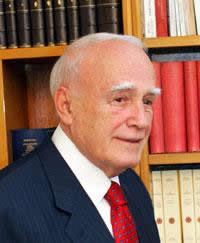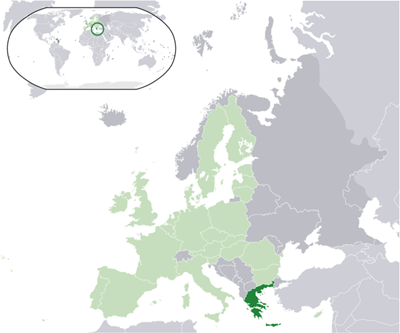|
 |

|
|
|
Dr Karolos Papoulias |
Presiedent of Greece |
Président de la Grèce |
| |
|
|
|
Dr Karolos Papoulias (Greek: Κάρολος Παπούλιας, IPA /ˈkaro̞ˌlo̞s paˈpuʎas/) (born June 4, 1929) is the current President of Greece. He is a former government minister and member of parliament.
Papoulias was born in the city of Ioannina. He studied law at the University of Athens and the University of Munich, has a doctorate in private international law from the University of Cologne, and is an associate of the Munich Institute for Southeast Europe. Apart from his native Greek, he also speaks German, Italian and French.
Papoulias was active in the resistance against the occupation forces during World War II, and took part in the struggle against the military regime of George Papadopoulos as a member of the Socialist Democratic Union, from his exile outside Greece. He was also a regular contributor to the Deutsche Welle programme in Greek during the same period.
A founding member of the Panhellenic Socialist Movement (PASOK) and close associate of Andreas Papandreou, Papoulias was elected to the Greek Parliament from Ioannina in the legislative elections of 1977, 1981, 1985, 1989 (June and November), 1990, 1993, 1996 and 2000. He was a member of the PASOK Central Committee, Executive Bureau Political Secretariat.
He served in many offices, including:
Deputy Minister for Foreign Affairs, from October 21, 1981 to February 8, 1984.
Alternate Minister for Foreign Affairs, from February 8, 1984 to 5 June 1985 and again from 5 June 1985 to July 26, 1985.
Minister for Foreign Affairs, from July 26, 1985 to July 2, 1989.
Alternate Minister for National Defence, from November 23, 1989 to February 13, 1990.
Minister for Foreign Affairs, from October 13, 1993 to January 22, 1996.
A former track and field and volley ball champion, Papoulias has been chairman of the National Sports Association since 1985. Karolos Papoulias is married to Maria Panou and has three daughters.
On December 12, 2004, Prime Minister Costas Karamanlis, leader of the New Democracy governing party, and George Papandreou, leader of the PASOK opposition, nominated Papoulias as for the position of President, which is chosen by the Parliament. On February 8, 2005, he was elected by an overwhelming parliamentary majority of 279 votes to serve a five-year term. On March 12, 2005 he was sworn in as President.
Political career
The 1967 military coup found him in Western Germany. He was among the founders of the Socialist Democratic Union which organized and mobilized Greeks working and studying in Western Europe against the colonel's junta. He was also a founding member of the first trade union resistance organization and broadcast regularly from Deutsche Welle radio.
Since December 1974 he has been continually elected to the PASOK Central Committee. He was also member of the Coordination Council, the Executive Bureau and the Political Secretariat, as well as Secretary of the PASOK International Re1ations Committee from April 1975 to 1985. For a number of years he was also a member of the Coordinating Committee of the Socialist and Progressive Parties of the Mediterranean. He was first elected to Parliament in 1977 and represented Ioannina continuously until the 2004 election.
From 1981 to 1989 and from 1993 to 1996, during the Andreas Papandreou governments, he was undersecretary, Deputy Minister and finally Minister of Foreign Affairs. During the Zolotas all party government he was Deputy Minister of Defence.
In the C. Simitis administration he was for a number of years Chairman of the Standing Committee on Defence and Foreign Affairs of the Hellenic Parliament.
During his long career as a Minister, he identified himself with a foreign policy that was clearsighted and comprehensive. In the 80's he played a key role in trying to bring about a solution to the problem of the Middle East. This culminated in the successful mediation for the safe departure of the trapped Palestinian resistance fighters and Arafat himself from Lebanon, on board Greek vessels in 1983.
He paid particular attention to the creation of sound relations with the Arab world and achieved, among other things, the normalisation of relations between Greece and Egypt and the establishment of the tripartite cooperation of Iran, Armenia and Greece. He held talks with a total of 12 Turkish Foreign Ministers and was firmly committed to the continuous and difficult effort to normalize Greek-Turkish relations. This culminated in the signing of the Papoulias-Yilmaz memorandum in 1988. He supported Turkey's European aspirations conditional on their respect for international law and European Union values.
In the period 1993-1996 and particularly at the crucial Essen Summit he played an important role in starting accession talks between the Republic of Cyprus and the European Union.
As president-in-office of the European Union and member of the contact group for the former Yugoslavia, together with Warren Christopher, Klaus Kinkel, Alain Juppe, Andrei Kosyrev and Hans Van Der Brook, he spared no effort to bring about a resolution of the crisis in Bosnia- Herzegovina. He signed the Interim Agreement with the Former Yugoslav Republic of Macedonia (FYROM), aiming at the establishment of better relations between the two countries. He has always kept channels of communication open with all Balkan leaders and has repeatedly mediated on behalf of the EU.
He was very interested in relations between Greece and the Balkan states and it was upon his initiative that the first meeting of the Foreign Ministers of the Balkans was organized in Belgrade in 1988. There, he began talks with Bulgaria and the then Soviet Union on the Burgas- Alexandroupolis oil pipeline.
He was responsible for the signing of the protocol of mutual civil and military assistance with Bulgaria in the 1980s. He restored friendly and neighbourly relations with Albania by ending the state of war between the two countries.
Karolos Papoulias has always been very supportive of any step towards detente, peace and disarmament e.g. the "Initiative of the Six" for peace and disarmament, the participation of Greece in the Conference on Disarmament and Peace in Europe and in the Conference for the Abolition of Chemical Weapons, his proposals to create a nuclear-free zone in the Balkans and the promotion of the idea of making the Mediterranean a sea of peace and cooperation. The JANNINA 1 tripartite cooperation conference, between Greece, Bulgaria and Romania, was his idea and he was a strong supporter of the Black Sea Conference, which he also chaired. With his visit to Washington in 1985 and the return visit of Secretary of State George Shultz, he made an important contribution to the redefining and improvement of Greek-American relations which had gone through a delicate phase during the previous years.
He is a founding member and, was until recently the president, of the Association for the Greek Linguistic Heritage. He speaks German, French and Italian. He was Greek pole-vault champion, member of the national volley-ball team and president for twenty five years of the historic Ethnikos athletic union. |
|
FRANÇAIS |
| |
Károlos Papoúlias (en grec Κάρολος Παπούλιας) est un homme politique grec.
Karolos Papoulias est né le 4 juin 1929 à Ioannina, lieu de naissance de sa mère. Son père, le Général de division Grigoris Papoulias, cadet de la classe héroïque de 1911, céda aux séquelles de la campagne d’Asie mineure de 1921 et décéda en septembre 1936. Karolos Papoulias entama sa scolarité à l’école primaire Pogoniannis, et la poursuivit aux collèges Pogoniannis et Zosimaion de la ville d’Ioannina, ainsi qu’aux lycées de Palaio Phaliro et de Pangrati d’Athènes. L’occupation nazie le trouva élève du collège Pogoniannis. Il s’engagea parmi les premiers dans la résistance armée contre les envahisseurs. Il étudia le droit aux universités d’Athènes, de Milan et de Cologne, où il rédigea sa thèse de doctorat en Droit international privé. Il fut collaborateur scientifique de l’Institut de l’Europe du Sud-Est de Munich. Il publia une présentation de la résistance grecque contre les Nazis chez Suhrkamp, célèbre maison d’édition allemande, ainsi qu’un certain nombre d’études et d’articles dans des journaux et revues étrangers.
Il se trouvait en République fédérale d’Allemagne lors du coup d’État militaire de 1967. C’est là qu’il participa à la fondation de l’Union Socialiste Démocratique de l’étranger, qui mobilisa et organisa les travailleurs, étudiants et scientifiques grecs de l’Europe occidentale contre la dictature des colonels. Il fut également membre fondateur de la première organisation syndicale résistante et travailla régulièrement avec la Deutsche Welle.
Depuis décembre 1974, il est élu sans discontinuer membre du Comité Central du PASOK. Il siégea au Conseil de Coordination, au Bureau exécutif ainsi qu’au Secrétariat politique, et fut aussi secrétaire du Comité des Relations internationales du PASOK du mois d’avril 1975 jusqu’en 1985. Il fut pendant de nombreuses années membre du Comité de Coordination des Partis socialistes et progressistes des pays méditerranéens. En 1974, il se présenta aux élections législatives sur les listes du PASOK dans la région d’Ioannina, mais ne fut pas élu, bien qu’il reçut le plus grand nombre de voix de son parti. Il fut élu pour la première fois député d’Ioannina en 1977 et continua d’être réélu sans cesse jusqu’aux élections de 2004.
De 1981 à 1989 et de 1993 à 1996, sous le gouvernement d’Andréas Papandréou, il fut Secrétaire d’État, Ministre suppléant et Ministre des Affaires étrangères. Pendant de nombreuses années, sous Costas Simitis, il fut Président de la Commission permanente de la Défense nationale et des Affaires extérieures du Parlement hellénique.
Sa longue carrière ministérielle s’identifia à une politique extérieure globale et visionnaire. Il joua un rôle actif pendant les années 1980 dans toutes les tentatives de résolution du problème moyen-oriental, efforts dont l’apogée fut sa médiation réussie en 1983: les combattants de la résistance palestinienne et Yasser Arafat lui-même purent partir en toute sécurité du Liban, où ils étaient bloqués, à bord de navires grecs.
Il accorda une importance particulière à l’établissement de relations stables et solides avec le monde arabe, la normalisation des relations gréco-égyptiennes et la mise en place d’une coopération tripartie entre l’Iran, l’Arménie et la Grèce en étant des exemples significatifs. Il eut des pourparlers avec douze Ministres des Affaires étrangères turcs au total, et engagea de manière déterminée les durs efforts de normalisation des relations grécoturques. Ces efforts furent récompensés lors de la signature du Mémorandum Papoulia-Yilmaz en 1988. Il soutint la perspective européenne de la Turquie à la condition que celle-ci respecte le droit international et le système de valeurs communautaire de l’Union européenne. En 1993-1996 il contribua de manière importante au lancement des négociations d’adhésion à l’Union européenne de la République de Chypre, et notamment lors du Sommet d’Essen, qui fut déterminant pour son intégration.
En tant que Président en exercice du Conseil de l’Union européenne, et en tant que membre du groupe de contact pour l’ex-Yougoslavie, avec MM. Warren Christopher, Klaus Kinkel, Alain Juppé, Andrei Kozyrev et Hans Van den Broek, il déploya tous ses efforts pour dépasser la crise de Bosnie-Herzégovine; il signa également l’accord intérimaire avec l’Ancienne République yougoslave de Macédoine, qui devait viser à l’amélioration des relations entre les deux pays.
Il maintint toujours les canaux de communication ouverts avec tous les dirigeants des Balkans et il joua à plusieurs reprises le rôle de médiateur de l’UE. Il s’intéressait vivement aux rapports de la Grèce avec ses voisins balkaniques et c’est à son initiative que se tint la première réunion transbalkanique de Ministres des Affaires étrangères à Belgrade en 1988. C’est par ailleurs à cette occasion qu’il obtint l’ouverture de négociations avec la Bulgarie et l’URSS de l’époque à propos de l’oléoduc de Bourgas-Alexandroupolis.
Il fut également à l’origine de la signature d’un protocole d’entraide civile et militaire avec la Bulgarie en pleine guerre froide. Il rétablit des rapports d’amitié et de bon voisinage avec l’Albanie en mettant fin à la situation de guerre qui prévalait jusqu’alors aux relations grécoalbanaises.
Karolos Papoulias a soutenu avec un intérêt jamais démenti tout pas positif vers la paix, la détente et le désarmement. C’est dans ce cadre que s’inscrivent « l’initiative des six » pour la paix et le désarmement, la participation de la Grèce à la Conférence pour le Désarmement et la Paix en Europe ainsi qu’à la Conférence pour l’abolition des armes chimiques, ses propositions pour la création d’une zone dénucléarisée dans les Balkans, et la promotion de l’idée consistant à faire de la Méditerranée un espace de paix et de coopération. Il fut également inspirateur de la Conférence de coopération tripartite réunissant la Grèce, la Bulgarie et la Roumanie (Jannina 1) et soutint résolument la Conférence des pays de la Mer noire, dont il fut d’ailleurs président.
Avec sa visite à Washington en 1985 et la visite de retour du Secrétaire d’État George Schultz il contribua activement à la redéfinition et la normalisation des relations avec les Etats-Unis qui avaient été rudement mises à l’épreuve les années précédentes.
Il fut membre fondateur, et jusqu’à récemment Président de l’Association de défense du Patrimoine linguistique.
Il parle l’allemand, le français et l’italien.
Il fut également champion de Grèce de saut à la perche, joueur dans l’équipe nationale de volley-ball et président pendant 25 ans du Corps historique du Cercle national de Gymnastique.
Il est marié à May Panou et a trois filles. |
| |
|
| From Wikipedia |
|
|
 |
|
|




